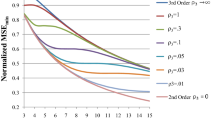Abstract
This paper proposes a new approach to reduce target estimation error, especially the measurement angle, when applied to medium- and long-range surveillance radars. If the target does not maneuver or change heading direction for a certain time interval, the predicted angle from the interacting multiple model (IMM) algorithm based on previous track information can be used to reduce the angle estimation error. In addition, the least squares algorithm should be used to calculate the accurate measurement angle. The proposed method, which is weighted IMM (WIMM), including the least squares, is tested using two simulation scenarios: a scenario with a non-maneuvering target and a scenario with a maneuvering target. The result shows that the new generated angle solution with the predicted azimuth and the measured azimuth works properly in these two scenarios and performs better than IMM.
Similar content being viewed by others
References
M. I. Skolnik, Introduction to Radar Systems, 3rd edition, McGraw-Hill, Singapore, 2001.
H. A. P. Blom and Y. Bar-Shalom, “The interacting multiple model algorithm for systems with Markovian switching coefficients,” IEEE Transactions on Automatic Control, vol. 33, no. 8, pp. 780–783, August 1988.
Y. Bar-Shalom and X. R. Li, Estimation and Tracking: Principles, Techniques and Software, Artech House, Boston, 1993.
C. B. Chang and M. Athans, “State estimation for discrete systems with switching parameters,” IEEE Transactions on Aerospace and Electronic Systems, vol. AES-14, no. 3, pp. 418–425, May 1978.
P. S. Maybeck and P. D. Halon, “Performance enhancement of multiple model adaptive estimator,” IEEE Transactions on Aerospace and Electronic Systems, vol. AES-31, no. 3, pp. 1240–1254, October 1995.
A. Farina and F. A. Studer, Radar Data Processing Volume-I, Introduction and Tracking, Research Studied Press, England, 1985.
Y. Bar-Shalom and T. E. Fortman, Tracking and Data Association, Academic Press, Orlando, 1988.
T. L. Song, J. Y. Ahn, and C. B. Park, “Suboptimal filter design with pseudo measurements for target tracking,” IEEE Transactions on Aerospace and Electronic Systems, vol. 24, no. 1, pp. 28–39, February 1988.
S. Yin, S. X. Ding, X. C. Xie, and H. Luo, “A review on basic data-driven approaches for industrial process monitoring,” IEEE Transactions on Industrial Electronics, vol. 61. No. 11, pp. 6418–6428, November 2014.
J. H. Ryu, D. H. Han, K. K. Lee, and T. L. Song, “Prediction-based interacting multiple model estimation algorithm for target tracking with large sampling periods,” International Journal of Control, Automation, and Systems, vol. 6, no. 1, pp. 44–53, February 2008.
S. Blackman and R. Popoli, Design and Analysis of Modern Tracking Systems, Artech House, Norwood, 1999.
R. A. Singer, “Estimating optimal tracking filter performance for manned maneuvering targets,” IEEE Transactions on Aerospace and Electronics Systems, vol. AES-6, no.4, pp. 473–483, July 1970.
Author information
Authors and Affiliations
Corresponding author
Additional information
Recommended by Associate Editor Chang Kyung Ryoo under the direction of Editor Fuchun Sun.
Seong Hee Choi received his M.S. degree in Electrical Engineering from Hanyang University in 2002. He works for the Agency of Defense Development. His research interests include data processing of radar systems, especially multiple target tracking and data association.
Taek Lyul Song received the Ph.D. degree in Aerospace Engineering from University of Texas at Austin in 1983. He is a Professor in the Department of Electronic Systems Engineering, Hanyang University. His research interests include target state estimation, guidance, navigation and control.
Rights and permissions
About this article
Cite this article
Choi, S.H., Song, T.L. Angle estimation error reduction method using weighted IMM and least squares. Int. J. Control Autom. Syst. 15, 354–361 (2017). https://doi.org/10.1007/s12555-015-0175-z
Received:
Revised:
Accepted:
Published:
Issue Date:
DOI: https://doi.org/10.1007/s12555-015-0175-z




